A Calm Brain
A Calm Brain
Unlocking Your Natural Relaxation System

Gayatri Devi, M.D.

Dutton
DUTTON
Published by Penguin Group (USA) Inc.
375 Hudson Street, New York, New York 10014, U.S.A.
Published by Dutton, a member of Penguin Group (USA) Inc.
First printing, June 2012
Copyright 2012 by Gayatri Devi, M.D.
All rights reserved. No part of this book may be reproduced, scanned, or distributed in any printed or electronic form without permission. Please do not participate in or encourage piracy of copyrighted materials in violation of the authors rights. Purchase only authorized editions.
 REGISTERED TRADEMARKMARCA REGISTRADA
REGISTERED TRADEMARKMARCA REGISTRADA
LIBRARY OF CONGRESS CATALOGING-IN-PUBLICATION DATA
Devi, Gayatri.
A calm brain : unlocking your natural relaxation system / Gayatri Devi.1st ed.
p. cm.
Includes bibliographical references and index.
ISBN: 978-1-101-58554-2
1. Cognitive-analytic therapy. 2. Relaxation. I. Title.
RC489.C6D48 2012
613.792dc23 2011046555
While the author has made every effort to provide accurate telephone numbers and Internet addresses at the time of publication, neither the publisher nor the author assumes any responsibility for errors, or for changes that occur after publication. Further, the publisher does not have any control over and does not assume any responsibility for author or third-party websites or their content.
Version_2
For Ginny and Mike
Acknowledgments
I would like to thank, in a very particular order:
Laura Yorke, literary agent extraordinaire: Expert horsewoman and inspiringly resilient recoverer from head injury.
Amy Hertz, Jo Ann Miller, and Stephen Morrow: My editing trio, who helped me give voice to my muddled thoughts.
Dani Levine and Eamonn Vitt: For their generous help with manuscript preparation.
William Blessing, Horacio Kaufmann, Joseph LeDoux, Randolph Nesse, and Clifford Saper: Neuroscientists from the universities of Flinders (Australia), New York, Michigan, and Harvard, for being kind and extraordinarily erudite sounding boards.
Roger Cracco, M.D.: Chairman Emeritus of Neurology, SUNY Downstate, who got me excited about the brain from the synapses on up.
Mahendra Somasundarum, M.D.: Distinguished Professor of Neurology, SUNY Downstate, who taught me that neurology is, indeed, the Queen of Medicine.
Lewis Glickman, M.D.: Professor Emeritus of Psychiatry, SUNY Downstate, who taught me to listen to patients.
INTRODUCTION
My Grandfathers Secret
H ave you ever known someone with whom you feel incredibly at peace? Someone whose calm is a contagion that spreads and takes hold and soothes the most tempestuous of moods? A cop who is fantastic in a crisis and is the partner everyone wants? A go-to colleague who makes you feel better when your boss is throwing a tantrum? The friend you instinctively turn to if you are scared or jittery? I am not talking about someone who is boring or sedated, but rather someone who is in a state of focused, relaxed, and confident alertness, the optimal state in which to sail through the oceans of our lives.
I knew such a person. In the tempest of our family, my grandfather was the eye of the storm. All around him churned the chaotic entropy that is the Indian household. And at the center stood my Thatha, a monument of stalwart self-possession.
Thatha awoke at five every morning and made himself a cup of hot water. Then he sat down in an old slingback chair. I would perch on a stool next to him. We would both read the morning newspaperor at least I would pretend to. When he was finished with the paper, he would stand up, cross his hands behind his back, and pace slowly up and down the length of the house in the tropical dawn. I would follow closely behind, not close enough to be a pest but close enough to observe and imitate his every movement. This would go on for about a half hour. He said it helped him think. There was a slow cadence to everything Thatha did during those morning hours before the household stirred and came alive.
My grandfather was a powerful man, a mathematician who went on to run the regional telephone company, in charge of thousands of employees. His quiet ways and demeanor belied the tremendous pressures and responsibilities that were part of his job. I remember him getting angry just once, when I was seven years old. As a joke, I dumped a bucket of manure into the well at the family farm, where we spent my school holidays. The farm had no drinking water as a result. My grandmother yelled and carried on, which fazed me not one bit. She was a volatile woman and prone to the excesses of temper characteristic of the many adults who swirled around my young life.
When my grandfather learned what had happened, the first thing he did was make arrangements to procure clean water. I stood there ashamed. I was his favorite grandchild. He had never been angry with me before, but he looked furious now. When the clamor died down, the two of us were left alone in the garden. I looked up at him, terrified. He didnt say a word, just watched me gently as if evaluating what to say. Finally, he spoke. That was an asinine thing to do, he said, so softly that I almost didnt hear him. And that was that. No further repercussions. I was devastated. To this day, few words have hurt me more.
Why? Because they came from this man I adored, this being of calm, this model of equanimity. I admired my grandfather in that moment, even in my mortification. That he attended to what needed to be attended to, that he reprimanded me succinctly and well, that he did all this so very calmly, and that, most of all, he communicated to his small, adoring granddaughter that everything was going to be okay.
At the time, I didnt quite grasp my grandfathers influence on me. I didnt yet know that I would try to spend much of my early adult life searching for the holy grail of his equanimity. In time I would learn the secrets of my grandfathers serenity. When, years later, I finally came upon the answer, I stumbled into it. Serendipitously. I discovered what my grandfather had, what I could have, that would allow me this delicious stillness, this confidence in times of tribulation, this calm. I went into medicine because it was my family trade. Both my great-grandfathers were physicians. My father was a surgeon, my mother a microbiologist. But within medicine, I chose my fieldneurologybecause nothing fascinates me more than the brain and because I knew that the answer to my quest lay within it. In this book, I will share what Ive learned about the neuroscience of calm and what we need to do to attain it. But first, lets look more closely at what I mean when I speak of calm.
Calm is a sense of internal composure that lets us function to the best of our abilities. It is the ideal state of the brain, supported by a body completely allied with this purposeful brain, allowing us to harness our cognitive powers while maintaining a perfect balance with our emotions. When you are calm, you are in your zone, unperturbed by distractions or distress. How can we get there? What does it take to reach this state of optimal brain functioning?

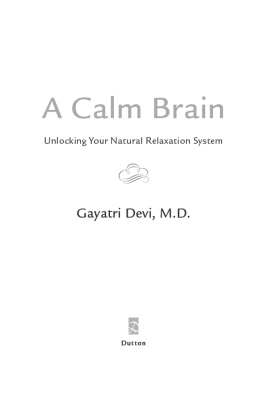

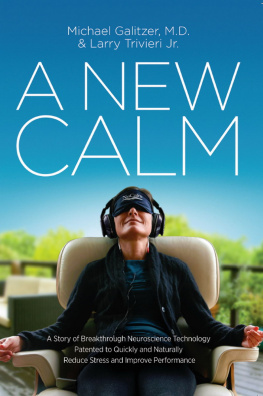





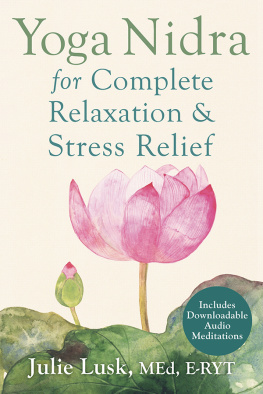
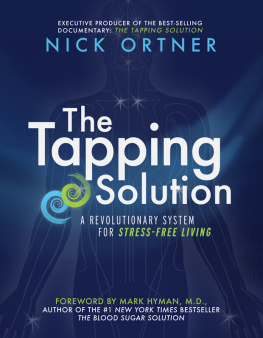
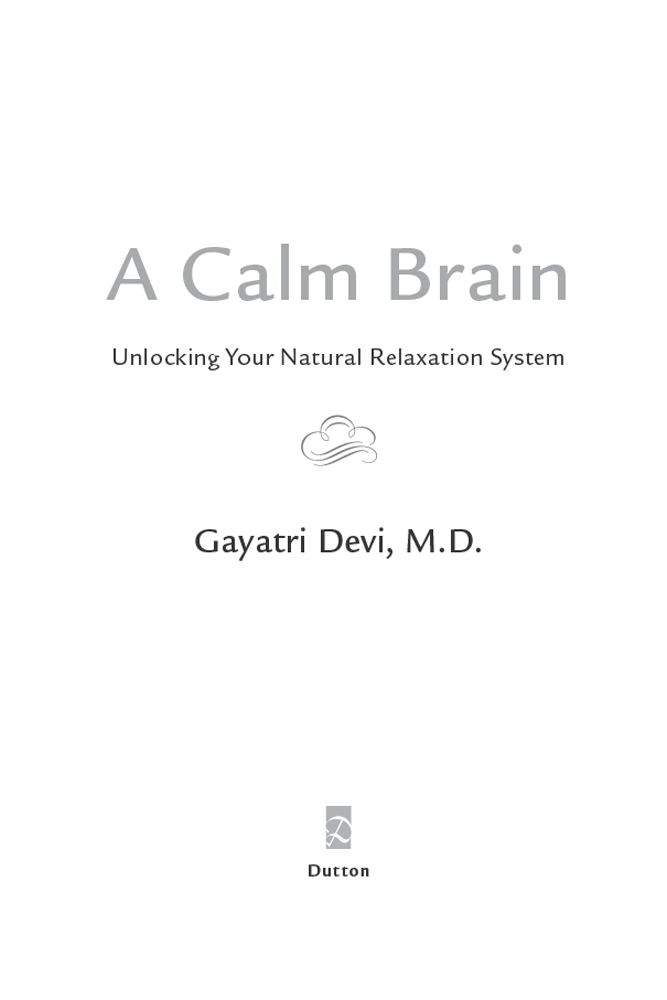


 REGISTERED TRADEMARKMARCA REGISTRADA
REGISTERED TRADEMARKMARCA REGISTRADA